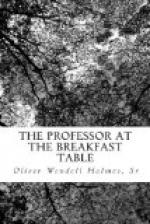I would transport this child to Rome at once, if I had my will. She should ripen under an Italian sun. She should walk under the frescoed vaults of palaces, until her colors deepened to those of Venetian beauties, and her forms were perfected into rivalry with the Greek marbles, and the east wind was out of her soil. Has she not exhausted this lean soil of the elements her growing nature requires?
I do not know. The magnolia grows and comes into full flower on Cape Ann, many degrees out of its proper region. I was riding once along that delicious road between the hills and the sea, when we passed a thicket where there seemed to be a chance of finding it. In five minutes I had fallen on the trees in full blossom, and filled my arms with the sweet, resplendent flowers. I could not believe I was in our cold, northern Essex, which, in the dreary season when I pass its slate-colored, unpainted farm-houses, and huge, square, windy, ’squire-built “mansions,” looks as brown and unvegetating as an old rug with its patterns all trodden out and the colored fringe worn from all its border.
If the magnolia can bloom in northern New England, why should not a poet or a painter come to his full growth here just as well? Yes, but if the gorgeous tree-flower is rare, and only as if by a freak of Nature springs up in a single spot among the beeches and alders, is there not as much reason to think the perfumed flower of imaginative genius will find it hard to be born and harder to spread its leaves in the clear, cold atmosphere of our ultra-temperate zone of humanity?
Take the poet. On the one hand, I believe that a person with the poetical faculty finds material everywhere. The grandest objects of sense and thought are common to all climates and civilizations. The sky, the woods, the waters, the storms, life, death love, the hope and vision of eternity,—these are images that write themselves in poetry in every soul which has anything of the divine gift.
On the other hand, there is such a thing as a lean, impoverished life, in distinction from a rich and suggestive one. Which our common New England life might be considered, I will not decide. But there are some things I think the poet misses in our western Eden. I trust it is not unpatriotic to mention them in this point of view as they come before us in so many other aspects.
There is no sufficient flavor of humanity in the soil out of which we grow. At Cantabridge, near the sea, I have once or twice picked up an Indian arrowhead in a fresh furrow. At Canoe Meadow, in the Berkshire Mountains, I have found Indian arrowheads. So everywhere Indian arrowheads. Whether a hundred or a thousand years old, who knows? who cares? There is no history to the red race,—there is hardly an individual in it;—a few instincts on legs and holding a tomahawk—there is the Indian of all time. The story of one red ant is the story of all red ants. So, the poet, in trying to wing his way back through the life that has kindled, flitted, and faded along our watercourses and on our southern hillsides for unknown generations, finds nothing to breathe or fly in; he meets




